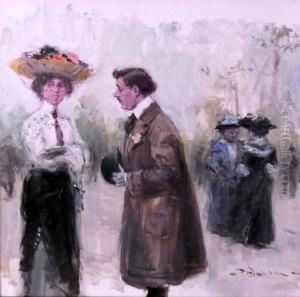Fritz Wahle Paintings
Fritz Wahle was a notable Austrian artist, born in 1868 in what was then part of the Austro-Hungarian Empire. His work spans a critical period in European art, capturing the transition from 19th-century traditions into the burgeoning modernist movement of the early 20th century. Wahle's artistic journey and contributions, though perhaps not as widely recognized as some of his contemporaries, provide a fascinating glimpse into the evolving artistic landscapes of his time.
Wahle's early life and education in art set the foundation for his later work. He studied at various prestigious art institutions, which was typical for artists of his era, to refine his technique and develop his unique style. His work exhibited a keen observation of daily life and a particular interest in capturing the nuances of human expression and interaction. This thematic interest was a common thread throughout his career, showcasing his ability to distill complex emotions and social dynamics into his art.
Throughout his career, Fritz Wahle experimented with different styles and mediums, reflecting the broader shifts in the art world during his lifetime. He was influenced by Impressionism, with its emphasis on light and movement, as well as the emerging principles of Expressionism, which sought to convey emotional experience rather than physical reality. However, Wahle managed to maintain a distinctive voice that echoed the traditional while embracing the new.
Despite the challenges posed by the two World Wars and the changing tastes in art, Wahle continued to produce work that resonated with audiences. His persistence in his artistry during turbulent times speaks to his dedication to his craft and his adaptability as an artist. Wahle's legacy, though not as prolific or widely celebrated as some of his peers, remains an important part of the tapestry of European art history.
Fritz Wahle passed away in 1944, leaving behind a body of work that continues to be studied and appreciated for its insight into a pivotal era in art. His contributions to the art world are a testament to the enduring power of observation, emotion, and human connection in art. Wahle's life and work offer valuable perspectives on the evolution of artistic expression and the unyielding spirit of creativity that defines the human experience.
